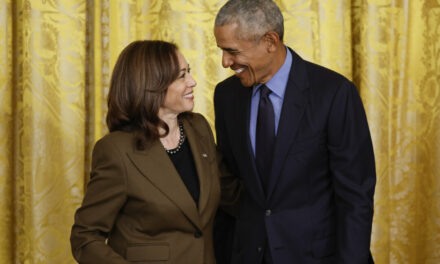We support our Publishers and Content Creators. You can view this story on their website by CLICKING HERE.
While Congress stagnates, America’s state houses are drafting and passing policies affecting millions. Now, more than ever, those legislative bodies operate without input from an opposition party or dissenting governor.
As of Oct. 21, there are 23 Republican trifectas, 17 Democratic trifectas, and 10 divided governments where neither party holds trifecta control, according to Ballotpedia. A trifecta means one party holds the state governorship and a majority in the state house and senate.
Heading into November’s general election, legislative supermajorities exist in 57 of the 99 legislative chambers in the union, according to data compiled by state and local government consultancy Stateside.
Republicans hold 41 of those veto-proof advantages, while Democrats own 20. All told, there is a partisan supermajority in at least one house of the Legislature in 35 of the 50 states.
However, in 14 of those states, the supermajority is held by an advantage of three seats or less. Michael Behm, Stateside’s co-CEO and principal, told The Epoch Times that organizations aligned with the Democratic and Republican parties are spending heavily on down-ballot races that could make or break a supermajority in the coming legislative term.
Even though voter interest is low in statehouse races compared with high-profile campaigns for national offices, Behm and others who spoke with The Epoch Times said the stakes are high. Most of the legislative actions that affect the public, such as policy on abortions, education, energy, health care, taxes, and transportation, come from decisions made in statehouses.
“With the federal government being so polarized and hamstrung these days, the action is at the state level,” Behm said.
Supermajorities
The definition of a supermajority varies from state to state. Generally, attaining a supermajority means a state legislative body has enough members from one party to pass laws without any votes from the minority party and enough votes to override the governor’s vetoes.
Heading into the 2024 general election, Republicans hold a supermajority in both houses of the state Legislature in Alabama, Arkansas, Florida, Idaho, Indiana, Kansas, Kentucky, Louisiana, Missouri, Montana, North Carolina, North Dakota, Ohio, Oklahoma, South Dakota, Tennessee, Utah, West Virginia and Wyoming.
Additionally, Republicans hold a supermajority in one chamber of the Legislature in Iowa, Mississippi, and South Carolina.
Democrats own a supermajority in both houses of the state Legislature in California, Delaware, Hawaii, Illinois, Maryland, Massachusetts, New York, and Rhode Island. Democrats have a supermajority in one chamber of the state Legislatures of Colorado, Connecticut, and Nevada.
Behm said that’s the largest number of supermajorities he has ever observed in state Legislatures. Ideologically, the domination of the Legislatures by a single party reflects intense political polarization in these states, he said.
Christopher Cooper, director of the Haire Institute for Public Policy at Western Carolina University, said a supermajority effectively limits the governor’s power to carry out policy priorities in a state with a divided government, where one party controls the Legislature and the governor is a member of the opposition party.
Four governors—Kansas’s Laura Kelly, Kentucky’s Andy Beshear, North Carolina’s Roy Cooper, and Vermont’s Phil Scott—preside over divided state governments where the opposition party holds a legislative supermajority.
The four governors’ Legislatures stripped them of much of their policymaking potency. In June, Scott, a Republican, told members of the press, “I think the power has gotten to their head” when speaking about how the Democrat-controlled Vermont General Assembly overrode six of his vetoes in a single override session.
In North Carolina, a supermajority almost wholly nullifies the will of a governor who already commands limited influence under the state’s constitution, Chris Cooper said.
With their supermajority, Republicans passed new abortion restrictions, drafted new election laws, and further throttled back Democratic Gov. Cooper’s power during the most recent legislative session.
“They have taken away appointment power from the North Carolina governor,” Chris Cooper said. “They have made a number of changes that make the already powerful state Legislature into something even more powerful.”
National Efforts
Behm said the rise of legislative supermajorities can be attributed to growing involvement from national, partisan groups known as 527 organizations. These are tax-exempt entities that can receive and spend unlimited amounts of money to influence federal, state, and local politics and elections.
Three decades ago, statehouse races were usually local contests directed and financed by city and state chambers of commerce, unions, and other parochial political organizations, Behm said. Now, national groups like the Democratic Legislative Campaign Committee (DLCC) and Republican State Leadership Committee (RLCC) invest vast national resources into the state’s legislative caucuses.
Behm said both party committees use professionals to recruit candidates and organize the partisan campaigns designed to build majorities in statehouses.
The New York State Assembly Chamber at the state Capitol in Albany, N.Y., on Jan. 16, 2024. Hans Pennink/AP Photo
“These 527 groups have turned state legislative races into national races,” Behm said.
Christopher Cooper said Republicans began to take over the statehouses in 2010 when the Republican Party launched an initiative known as Project REDMAP. The plan called for investing huge sums into state legislative races that were previously overlooked in Washington and flipping chambers to the GOP.
“They did as advertised,” Cooper said. “They turned maps red.”
In 2024, Democrats can take a supermajority in a house of the Legislature in Colorado, Connecticut, New Mexico, and Nevada by winning three additional seats or less. Republicans can win a supermajority in one body of the Iowa and South Carolina state legislatures by the same margin.
Winning a supermajority in those chambers would give Democrats complete control of the statehouse in Connecticut, Colorado, and Nevada. Republicans could gain a similar advantage in Iowa and South Carolina.
At the same time, Democrats retain their Senate supermajority in New York by a single seat, as do Republicans in Montana and North Carolina. The supermajority is secured by only two Democratic seats in Delaware’s House, and by two Republican seats each in Florida’s Senate, Kansas’ Senate, and Missouri’s Senate.
Representatives of the RSLC and DLCC did not respond to The Epoch Times’ request for comment. However, both groups regularly publish public memos detailing their plans for the forthcoming election.
In June, RSLC President Dee Duncan said the group and its affiliated political action committees were planning to spend $38 million to defend GOP majorities and supermajorities around the country while simultaneously weakening “Democratic strongholds.”
“The greatest long-term threat to our party is undoubtedly the possibility that Democrats this year could regain control of the majority of our nation’s state legislative chambers for the first time since 2010,” Duncan said in the memo.
In its latest memo, the DLCC asked for more money to support its candidates in statehouse races.
“The target budget for the DLCC for the 2023-2024 cycle is $60 million—our most expansive to date—yet more resources are still needed heading into November to fully support this ballot level determining the landscape of rights for our communities,” the memo said.
The Oct. 10 message written by DLCC President Heather Williams said the “party’s collective effort to win key state legislative races could fall short this cycle without a significant increase in financial support.” With less than a month until Election Day, the memo said the DLCC still needed $26 million more to achieve its goals.
The memo said the organization’s internal data suggested the Democratic Party could see an outcome similar to 2020, when it narrowly won the White House and Congress but lost 100 statehouse seats and two chamber majorities. The memo suggested the Democratic Party suffers from a phenomenon it called ballot roll-off.
Democratic voters, it said, tend to vote for the top federal races but do not turn in a straight ticket ballot with votes for state and local candidates.
“Over the past decade, Republicans have avoided the negative effects of roll-off, with just 37 percent of their races impacted compared to the 80 percent of competitive races featuring Democrats down-ballot,” Williams said in the memo.
Nevada Gov. Joe Lombardo speaks during a groundbreaking ceremony in Las Vegas on April 22, 2024. Ethan Miller/Getty Images
View From the Battlegrounds
Echoing concerns from the DLCC, political observers in two battleground states facing key statehouse elections—North Carolina and Nevada—said voters are inundated with messaging about federal races but hear little, and likely know less, about their statehouse races.
Both the Tar Heel State and the Silver State face crucial contests determining the future of their divided state governments.
In November, North Carolina voters will choose a new governor and decide whether Republicans will continue to hold a veto-proof supermajority in both houses of the North Carolina General Assembly.
In Nevada, Gov. Joe Lombardo, a Republican in office through 2026, is facing the possibility that both the Nevada Legislature’s Senate and Assembly will contain Democratic supermajorities when the body reconvenes in 2025.
Democrats need only win a single seat in the Senate to override any Lombardo veto.
John Tsarpalas, president of the Nevada Policy Research Institute, told The Epoch Times that Lombardo issued a record number of vetoes during the 2023 portion of the legislative session. The governor also formed a PAC aiming to raise $8 million in support of Republican candidates running for legislative seats, Tsarpalas said.
Nevertheless, Tsarpalas said, the prevailing feeling in Nevada is that Democrats will gain a supermajority in the Senate. Republicans controlled the statehouse until 2016 when Democrats took over the majority but did not have a supermajority. With new power, Democrats drew themselves more favorable district maps, Tsarpalas said, adding that “gerrymandered” boundaries will help preserve Democratic power in Carson City.
If Democrats succeed in November, they will pursue a liberal policy agenda focused on raising revenue through taxes and mandatory fees, Tsarpalas predicted. He said Democrats also are campaigning on promises to increase the amount of affordable housing by subsidizing construction, possibly enforcing rent control, and offering financial assistance to lower-income Nevadans.
People vote on the first day of in-person early voting at Desert Breeze Community Center in Las Vegas on Oct. 19, 2024. Ethan Miller/Getty Images
In North Carolina, Christopher Cooper said the polling indicates that Attorney General Josh Stein, a Democrat, will likely secure victory over Lt. Gov. Mark Robinson, a Republican, in the governor’s race. However, he said the Democrats have “essentially zero chance” to win a majority in Raleigh thanks to the GOP’s previous efforts.
Cooper said the North Carolina General Assembly was controlled by Democrats for 100 years, first as part of the Solid South and then as a reflection of the state’s politically varied population. That all changed in 2010 when Republicans won the majority in the Assembly and redrew electoral maps to reinforce their hold on the capital.
Donald Bryson, the CEO of the Raleigh-based John Locke Foundation, noted that Republicans only won a supermajority in 2023 when North Carolina state Rep. Tricia Cotham switched her party allegiance from Democrat to Republican.
Like Lombardo, Bryson said Gov. Roy Cooper issued a record number of vetoes to resist the Republican agenda. In their time in the driver’s seat, Republicans pursued what Bryson called a “meat and potatoes” conservative agenda of lowering taxes and expanding access to charter schools.
Both Bryson and Christopher Cooper declined to predict whether the Republicans will retain a supermajority in both houses of the Assembly in November. Cooper said five of the races will determine the fate of the Legislature.
Bryson said winning the supermajority will determine whether Republicans must negotiate with a Democratic governor to pass a state budget and other weighty matters or if they can set the agenda without resistance.

 Conservative
Conservative  Search
Search Trending
Trending Current News
Current News 







